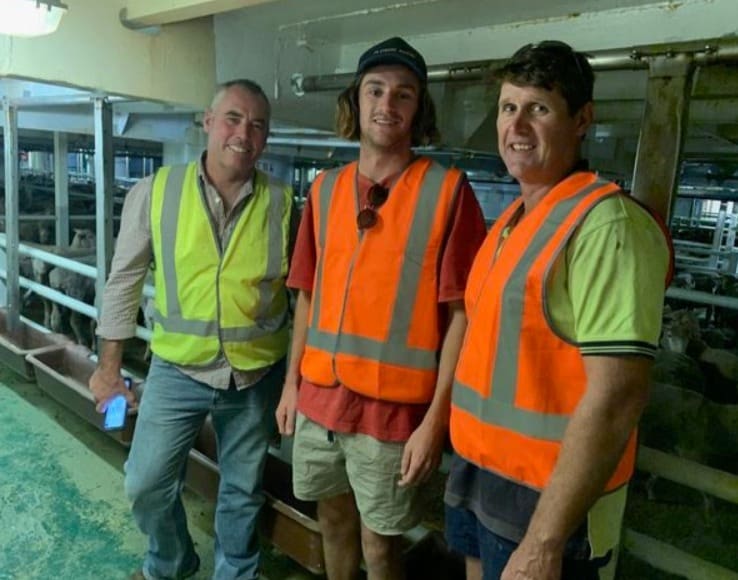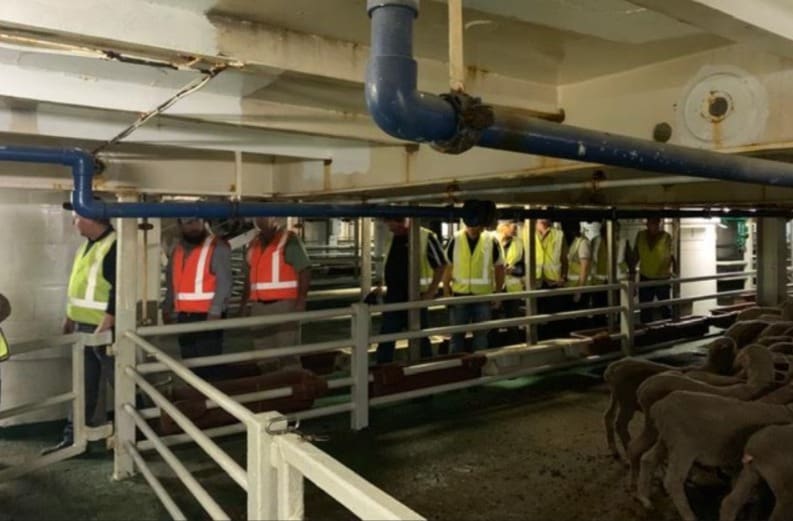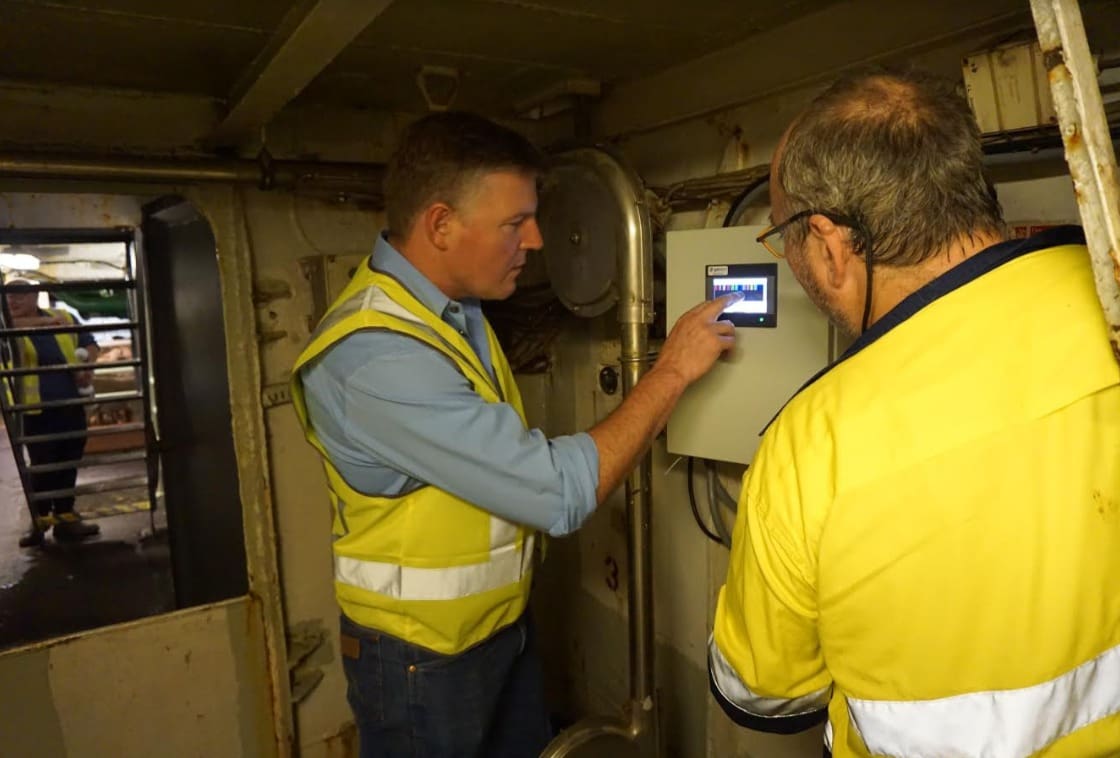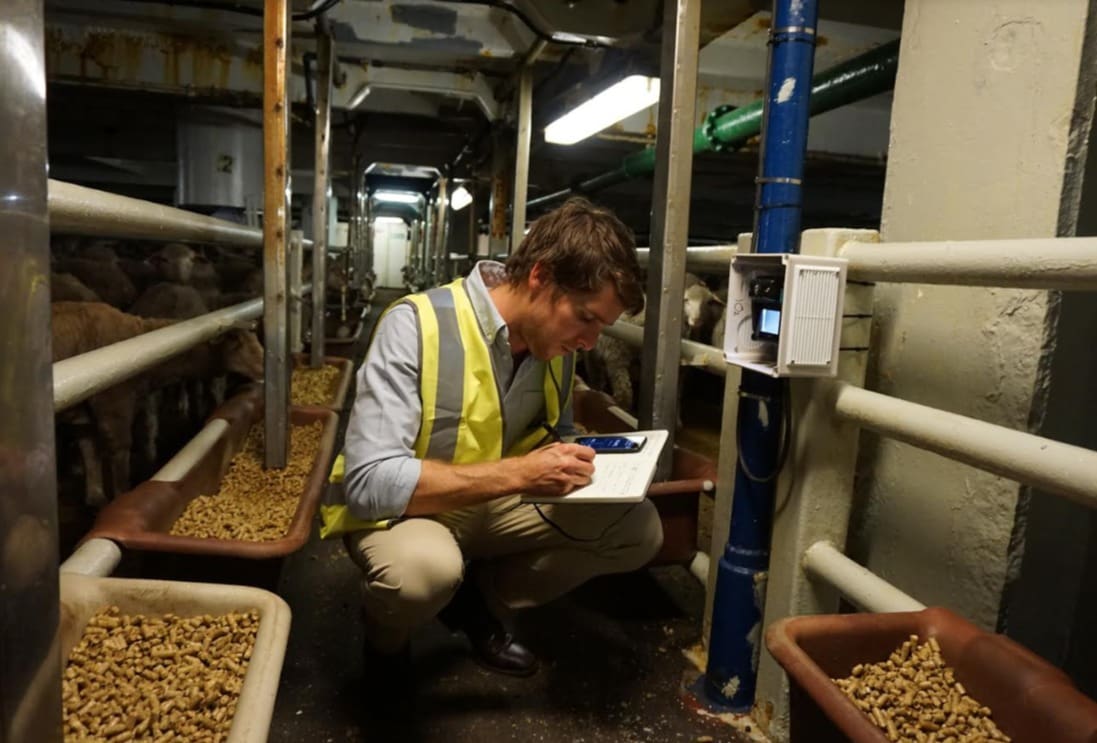
WA sheep producers, Jayden Hooper, Derek Hooper and Murray Hall on the Al Messilah tour.
AUSTRALIA’s live sheep trade has continued its battle to regain community trust this week with an organised tour of the vessel the Al Messilah in Fremantle this week.
The trade also released figures showing that the last eight sheep shipments from Australia have recorded mortality rates of less than 1 percent, well under the figure at which the government requires investigation.
Livecorp also released details of a dehumidification equipment trial on the vessel as the industry looks at ways to meet new heat stress rules and avoid the phasing out of the Northern Summer Middle East trade should Labor win the federal election.
On May 7 about 40 Western Australian sheep producers and 10 Australian Veterinary Association members toured the Al Messilah before it departed with sheep to the Middle East.
The tour was organised by the Sheep Collective — a coalition of leading WA sheep producers, transport and feedlot operators, exporters and importers drawn together by suspended exporter Emanuel Exports to provide transparent information about the sheep industry and live sheep export trade. The Sheep Collective is part of a wider transparency project being run by the company.
The exporter for the latest Al Messilah shipment was RETWA, a subsidiary of the majority Kuwait government-owned Al Mawashi/Kuwait Livestock and Trading Company and Australia’s biggest sheep buyer.
The Al Messilah was loaded with 58,000 sheep this week, bound for Kuwait and the United Arab Emirates, which represents a 23 percent reduction in loading density under new space allowance requirements. Voyage mortalities on the Al Messilah since RETWA export licence was granted are: December 2018 – 0.198pc; January 2019 – 0.22pc; February 2019 – 0.32pc, and April 2019 – 0.29pc.
Industry transparency improving – ALEC

Al Messilah tour members inspect the sheep pens.
Australian Livestock Exporters’ Council chief executive officer Mark Harvey-Sutton said the live export vessel tours organised by the Sheep Collective for producers, industry officials and politicians have made a different to the level of transparency around the industry.
He said the live export trade needed to do everything it could to tell its story and to be prepared for discussions with the Labor Party should it gain government after the Federal Election on May 18.
“The key to trust is transparency.
He said the sheep industry will be doing everything it could to try to “reset the relationship with the community,” Mr Harvey-Sutton said.
WAFarmers rejects Wilkie call to ban sheep and cattle exports
The latest export vessel tour occurred after a rally against live export in Hobart last weekend and independent federal MP Andrew Wilkie declaring that the community wanted a complete ban on all live export, including sheep and cattle.
“The community is wise to the lies being peddled by the Federal Government and the industry.
“For example, they know that there’s no way to make live export ships humane and that nothing short of a complete ban will do the job,” he said.
“They also know that live export isn’t in Australia’s economic self-interest because far more jobs will be created by processing meat on-shore.”
WAFarmers Livestock president David Slade responded to Mr Wilkie by defending the Federal Government.
“The Federal Government and the industry have not lied to the community, as Mr Wilkie has suggested.
“The Federal Government has worked closely with Australia’s agriculture industry to ensure it has the ability, capacity and culture to regulate the trade effectively, and to ensure Animal Welfare Standards are further progressed and maintained,” Mr Slade said.
“WAFarmers is committed to the continuation of the live animal export trade. We have incredibly high animal welfare standards, and animal welfare remains central to everything we do as an industry.
“The Moss Review identified necessary changes within the department, and as a result the Australian community can have confidence that high animal welfare standards are currently being achieved,” he said.
“The industry has welcomed independent observers on live export vessels, administered lower stocking densities, improved ventilation systems, and adopted the voluntary suspension during the summer months.”
WAFarmers said it remained actively involved with the government, exporters and broader industry to ensure the long-term animal welfare best practice is maintained.
Dehumidification technology could be the answer

An Al Messilah crew member shows LiveCorp chief executive officer Sam Brown, left, some of the dehumidification equipment installed on the ship.
Dehumidification technology might enable the live export sheep trade to continue, Livecorp chairman Terry Enright said this week.
The chairman of the industry research and development body said the dehumidification project has the potential to substantially shift the paradigm for the industry, but it is high risk research yet to be proven on a livestock vessel.
“There’s still a long way to go, but this may ultimately allow Australia to continue its role as a valued partner in supplying the Middle East and contributing to food security, as well as providing an important market for sheep producers in Western Australia.”

A crew member monitors dehumidification equipment on the Al Messilah.
Mr Enright said the sensors installed will measure temperature, humidity, and volatile gases like ammonia and methane, to collect baseline data during one of the last sheep voyages to the Middle East before the northern summer moratorium comes into effect.
“The same ship will be used for a trial in the Middle East in June or July without livestock, involving air being pumped into two decks from dehumidification units mounted on a wharf to see whether it’s possible to reduce the wet bulb temperature at different ventilation rates,” he said.
“Ventilation experts, ship owners and exporters have told us for many years that it’s just not possible to air condition livestock vessels, because air conditioners rely on stable, low air turnover while animals need a large volume of air movement to remove the gases being produced.
“However, technology continues to evolve and many industries have gone from simply opening a window or turning on a fan, to different ways of controlling environmental conditions,” Mr Enright said.
Mr Enright said other factors also need to be considered if the technology works, such as the cost of installing and running the dehumidification units on livestock vessels.
“If the static trial is successful and we’re confident we can manage potential risks, another trial will be planned with the equipment installed on a ship for a commercial voyage with livestock on board.”
The project is being funded through a grant of $2.2 million, announced earlier in the year by Minister for Agriculture, David Littleproud.

HAVE YOUR SAY